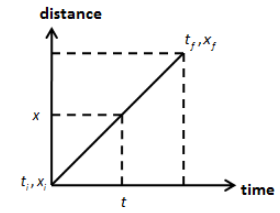
In uniform motion, average speed is equal to instantaneous speed at any point of time
A. True
B. False
Answer
564.9k+ views
Hint: In the uniform motion, a speed of a body remains constant at any instant of time. The average speed is the ratio of total distance covered by the body to the total time taken by the body to cover this distance. The instantaneous speed is the speed of the body at an instant of time.
Complete answer:
Let us define a uniform motion. In uniform motion, a speed of a body remains constant at any instant of time. Therefore, we can say the body covers equal distance in an equal interval of time. In the uniform motion, since the velocity does not change, the acceleration of the body remains the constant.
Now, the average speed is the ratio of total distance covered by the body to the total time taken by the body to cover this distance. In a non-uniform motion, the speed of the body changes at any instant of time. So, the average of these speeds is the average speed of the body on its journey. The instantaneous speed is the speed of the body at an instant of time. Therefore, the instantaneous speed is given as,
\[v = \dfrac{{dx}}{{dt}}\]
In the uniform motion, the distance-time graph shows a straight line passing through origin. We know that the slope of the straight line is the speed of the body.

In the above distance-time graph, the average speed is given as,
\[{v_{avg}} = \dfrac{{{x_f} - {x_i}}}{{{t_f} - {t_i}}}\]
\[ \Rightarrow {v_{avg}} = \dfrac{{\Delta x}}{{\Delta t}}\]
And, the instantaneous speed of the body at time t is given as,
\[v = \dfrac{x}{t}\]
We know that the slope of the distance-time graph remains constant for the uniform motion. Therefore,
\[\therefore\dfrac{{\Delta x}}{{\Delta t}} = \dfrac{x}{t}\]
Thus, we can say that the average speed is equal to instantaneous speed for the uniform motion. Therefore, the given statement is true.
So, the correct answer is option A.
Note:Do not get confused between average speed and average velocity. The average velocity is the ratio of the total displacement of the body to the total time taken. Thus, if the displacement of the body is zero then the average velocity becomes zero. The average speed cannot be zero if the body retains to the same position after travelling some distance.
Complete answer:
Let us define a uniform motion. In uniform motion, a speed of a body remains constant at any instant of time. Therefore, we can say the body covers equal distance in an equal interval of time. In the uniform motion, since the velocity does not change, the acceleration of the body remains the constant.
Now, the average speed is the ratio of total distance covered by the body to the total time taken by the body to cover this distance. In a non-uniform motion, the speed of the body changes at any instant of time. So, the average of these speeds is the average speed of the body on its journey. The instantaneous speed is the speed of the body at an instant of time. Therefore, the instantaneous speed is given as,
\[v = \dfrac{{dx}}{{dt}}\]
In the uniform motion, the distance-time graph shows a straight line passing through origin. We know that the slope of the straight line is the speed of the body.

In the above distance-time graph, the average speed is given as,
\[{v_{avg}} = \dfrac{{{x_f} - {x_i}}}{{{t_f} - {t_i}}}\]
\[ \Rightarrow {v_{avg}} = \dfrac{{\Delta x}}{{\Delta t}}\]
And, the instantaneous speed of the body at time t is given as,
\[v = \dfrac{x}{t}\]
We know that the slope of the distance-time graph remains constant for the uniform motion. Therefore,
\[\therefore\dfrac{{\Delta x}}{{\Delta t}} = \dfrac{x}{t}\]
Thus, we can say that the average speed is equal to instantaneous speed for the uniform motion. Therefore, the given statement is true.
So, the correct answer is option A.
Note:Do not get confused between average speed and average velocity. The average velocity is the ratio of the total displacement of the body to the total time taken. Thus, if the displacement of the body is zero then the average velocity becomes zero. The average speed cannot be zero if the body retains to the same position after travelling some distance.
Recently Updated Pages
Master Class 11 Computer Science: Engaging Questions & Answers for Success

Master Class 11 Business Studies: Engaging Questions & Answers for Success

Master Class 11 Economics: Engaging Questions & Answers for Success

Master Class 11 English: Engaging Questions & Answers for Success

Master Class 11 Maths: Engaging Questions & Answers for Success

Master Class 11 Biology: Engaging Questions & Answers for Success

Trending doubts
There are 720 permutations of the digits 1 2 3 4 5 class 11 maths CBSE

Discuss the various forms of bacteria class 11 biology CBSE

Explain zero factorial class 11 maths CBSE

What organs are located on the left side of your body class 11 biology CBSE

Draw a diagram of nephron and explain its structur class 11 biology CBSE

How do I convert ms to kmh Give an example class 11 physics CBSE




